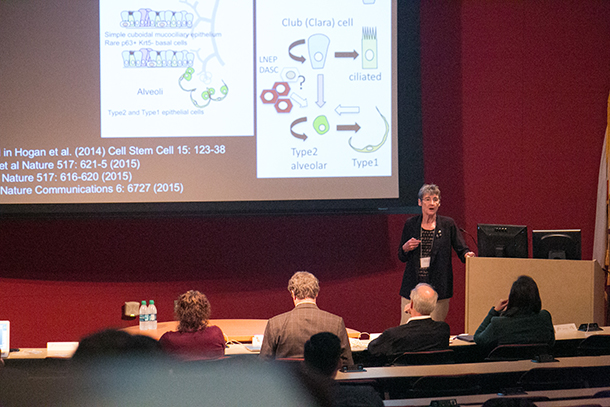
Physicians and leading scientists from across the country gathered recently to celebrate the inauguration of the Keck School of Medicine of USC’s Hastings Center for Pulmonary Research.
More than 100 people attended the symposium, titled “The Pulmonary Challenge: Innovations in Lung Development, Stem Cells and Regeneration,” held March 11 in the Aresty Auditorium on the USC Health Sciences Campus. The event highlighted the center’s core research focus on lung injury, repair and regeneration, said the center’s director Zea Borok, USC Stem Cell affiliate principal investigator and chief of the division of pulmonary, critical care and sleep medicine at Keck Medicine of USC.
“The amount of support on this campus and beyond for lung research is encouraging,” said Borok, who also is professor of medicine and biochemistry and molecular biology at the Keck School. “I must acknowledge the generosity and vision of the board of the Hastings Foundation and their support for establishment of the center, with the goal of transforming lung research at USC.”
The Hastings Center brings together basic and translational researchers and clinicians to create a nationally recognized center of excellence for advanced lung disease that builds on existing collaborations within and outside of Keck Medicine. The center’s goal is to develop new treatments for pulmonary diseases that affect millions of people around the world.
“The Hastings Foundation has had a long history with Keck Medicine and is proud to support the groundbreaking pulmonary research happening here,” said John Reith, Hastings Foundation president. “We look forward to seeing the advancements in research and patient care as a result of the spectacular work done by Dr. Borok and the rest of the team at the Hastings Center.”
The Hastings Foundation has been a longstanding supporter of pulmonary research at the Keck School, donating more than $32 million since 1975. Its most recent gift of $7.5 million supported the launch of the Hastings Center, which will allow Keck School scientists to expand pulmonary research and will facilitate the recruitment of new faculty members like Amy Firth, assistant professor in the department of stem cell biology and regenerative medicine, and in the division of pulmonary, critical care and sleep medicine, who was one of the symposium speakers.
“I’m honored to have been the first faculty member recruited to the Hastings Center,” Firth said. “The support of the Hastings Foundation was instrumental in continuing my research into how induced pluripotent stem cells—adult cells that have been programmed into a stem cell-like state—can help regenerate damaged or diseased lung stem cells. This work can fundamentally change the way we treat lung disease.”
Brigid Hogan, a national leader in lung development and cell biology, presented the keynote address. The George Barth Geller Professor and Chair of the Department of Cell Biology at Duke University Medical Center, Hogan presented, “The Life of Breath: Stem Cells of the Lung in Repair and Regrowth.”
“We were fortunate to have cutting-edge speakers from outside the center, as well as to feature some of the exciting work being done by our own researchers,” Borok said.
Speakers included Mary Armanios, associate professor in the Department of Oncology at The Johns Hopkins University School of Medicine, who spoke about “Telomeres and Telomerase in the Lung: Implications for Patient Care,” and James P. Kiley, director of the division of lung diseases at the National Heart, Lung and Blood Institute, National Institutes of Health, who spoke about the organization’s strategic vision for the future of pulmonary research.
Other scientific speakers were Jeffrey Whitsett, University of Cincinnati; Mark Krasnow, Stanford University; Darrell Kotton, Boston University; Hal Chapman, University of California, San Francisco; and Scott Fraser, USC.
